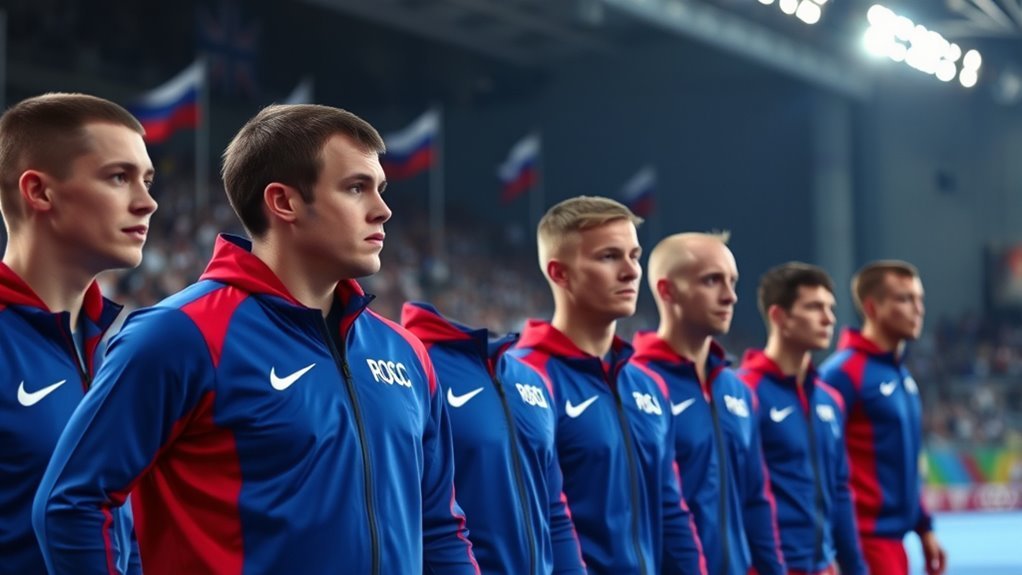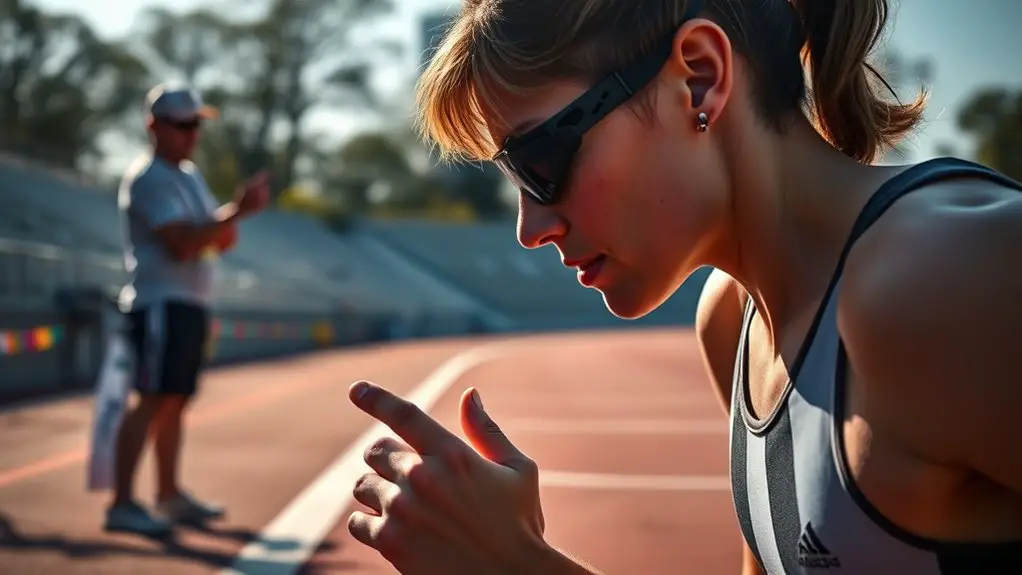Russian athletes are competing as the Russian Olympic Committee (ROC) due to the country’s reputation being tarnished by a major doping scandal. This status allows athletes to participate in international events while adhering to strict anti-doping regulations set by the World Anti-Doping Agency (WADA). Competing as the ROC also means they face unique challenges, including elevated scrutiny and pressure. To understand more about the implications and reactions surrounding this situation, there’s much more to explore.
Background of the Russian Doping Scandal
Although many people remember the excitement of international sports, the background of the Russian doping scandal reveals a darker side. This scandal isn’t just a blip in doping history; it’s a stark reminder of how the quest for glory can compromise athlete accountability. You might wonder how athletes, once seen as paragons of virtue, could engage in such unethical practices. The systemic approach to doping in Russia not only tarnished individual reputations but also cast a shadow over the spirit of sportsmanship. As you explore this issue, consider the implications for freedom and fairness in competition. Athletes should be celebrated for their hard work, not marred by a culture that prioritizes victory at any cost. It’s time we demand integrity in sports.
Overview of the World Anti-Doping Agency (WADA)
The World Anti-Doping Agency (WADA) plays a vital role in maintaining fair play in sports by setting doping regulations and ensuring compliance among athletes. You’ll see how WADA enforces penalties for violations and works to protect the integrity of athletic competition. Understanding WADA’s framework is essential for grasping the context of Russian athletes competing as the ROC.
WADA’s Role Explained
When it comes to ensuring fair play in sports, the World Anti-Doping Agency (WADA) plays an essential role. You might not realize how crucial their work is in shaping anti-doping policies that create a level playing field for all athletes. WADA’s effectiveness hinges on its ability to enforce these policies globally, promoting integrity and transparency in competitive sports. By establishing rigorous testing protocols and educational programs, WADA empowers athletes to compete without the shadow of doping. This commitment not only protects the athletes but also preserves the spirit of sport, allowing everyone to enjoy the true essence of competition. Ultimately, WADA endeavors to uphold the ideals of freedom and fairness, ensuring that sporting achievements are earned, not chemically enhanced.
Doping Regulations Overview
As you explore the world of competitive sports, understanding the doping regulations set forth by the World Anti-Doping Agency (WADA) is vital. WADA aims to guarantee a level playing field, promoting fairness and athlete rights. The agency outlines strict guidelines on prohibited substances and methods, emphasizing the importance of clean competition. Athletes must be aware of the doping consequences, which can include suspensions, loss of titles, and tarnished reputations. It’s imperative for you to stay informed about what’s allowed and what isn’t, as ignorance isn’t a valid defense. Empowering yourself with knowledge about these regulations not only safeguards your integrity but also champions the spirit of freedom in sports, allowing everyone to compete on equal terms.
Compliance and Penalties
Understanding compliance with doping regulations is vital for athletes, especially given the serious penalties imposed by the World Anti-Doping Agency (WADA). To maintain your freedom in competition, you must adhere to strict compliance measures. WADA’s framework guarantees a level playing field, but non-compliance can lead to harsh repercussions. Penalty assessments can range from suspensions to lifetime bans, depending on the severity of the violation. It’s important to educate yourself on these regulations to avoid pitfalls that could jeopardize your career. Remember, staying informed not only protects your freedom as an athlete but also upholds the integrity of your sport. By embracing compliance, you’re taking a stand for fair competition and your own future.
The Formation of the Russian Olympic Committee (ROC)
When you look at the formation of the Russian Olympic Committee (ROC), it’s important to understand the context of doping scandals that prompted its establishment. The ROC was created in response to international pressure and new regulations aimed at restoring Russia’s reputation in sports. As you explore this topic, consider how these factors shaped the committee’s formation and its impact on athletes competing under the ROC banner.
History of Doping Scandals
Although the Russian Olympic Committee (ROC) was officially formed in 2014, its roots are deeply intertwined with a series of high-profile doping scandals that have tarnished Russia’s reputation in international sports. Your understanding of doping history reveals how systemic issues eroded athlete integrity, leading to widespread distrust. Scandals like the Sochi Olympics and the state-sponsored doping program highlighted a troubling disregard for fairness and transparency, raising questions about the true spirit of competition. As athletes sought freedom to compete honestly, these controversies weighed heavily on their careers. The ROC’s formation aimed to distance itself from this tainted past, yet the shadow of doping still looms large, forcing both athletes and officials to reckon with the consequences of those choices.
Formation of ROC
In the wake of ongoing scandals, the formation of the Russian Olympic Committee (ROC) in 2014 marked a pivotal moment for Russian sports. You see, the ROC aimed to restore credibility and guarantee athlete representation on an international stage. This committee was created to navigate the complexities of governance and compliance, offering a new structure that promised transparency and fairness. By uniting various sports federations, the ROC sought to foster a sense of unity among athletes who longed for freedom in their pursuits. While challenges persist, the ROC formation represents a step toward regaining trust and empowering athletes to compete without the shadow of past controversies. It’s a journey of resilience, aiming to uplift Russian sports and its athletes.
International Response and Regulations
As the ROC emerged, it faced immediate scrutiny from the international sports community, which raised questions about its legitimacy and compliance with global standards. You might wonder how this impacts international relations and sports diplomacy. Many nations hesitated to accept the ROC’s participation, fearing it could undermine the integrity of competitions. While some countries advocated for inclusion based on athletes’ rights, others argued for strict regulations to maintain fairness. The balancing act between allowing athletes to compete and upholding ethical standards became a hot topic. As debates continue, the ROC’s role in international sports will likely influence future regulations and diplomatic interactions, shaping the landscape of competitive sports and the ideals of freedom and fairness we all value.
Implications for Athletes Competing Under ROC
Competing under the Russian Olympic Committee (ROC) banner presents unique challenges and implications for athletes. You may find that your experiences differ greatly from those of your peers. The pressure to perform while steering through political scrutiny can be overwhelming. Here’s a snapshot of some implications:
| Implication | Description | Impact on Athletes |
|---|---|---|
| Identity | Competing as ROC alters national pride | May affect motivation |
| Scrutiny | Increased media attention | Heightened stress levels |
| Support | Limited backing from home country | Feelings of isolation |
| Expectations | Elevated performance demands | Pressure to succeed |
| Recognition | Complicated medal acknowledgment | Confusion over achievements |
Steering through these competitive challenges can shape your journey, testing your resilience and determination. Adopting a growth mindset may help athletes navigate these difficulties more effectively.
The Role of Neutrality in International Sports
While steering through the complexities of international sports, neutrality plays an essential role in maintaining fairness and integrity. It guarantees that athletes compete on equal footing, free from the political tensions that often cloud the arena. You might appreciate how sports diplomacy thrives in this environment, fostering connections across borders and cultures. However, neutrality challenges arise when nations impose restrictions, creating disparities among athletes. This can lead to questions about the very essence of competition. By maneuvering these challenges, we can preserve the spirit of sportsmanship and uphold the values we cherish. In this delicate balance, neutrality isn’t just a concept; it’s a commitment to fairness, allowing athletes to shine based solely on their talent and dedication.
The Impact on National Identity and Patriotism
Neutrality in international sports can have profound implications for national identity and patriotism. When Russian athletes compete as ROC, it challenges your sense of national pride and cultural identity. You might feel a disconnect, as these athletes, once symbols of a unified nation, now represent a more ambiguous entity. This scenario can stir mixed emotions; you may find yourself grappling with feelings of loyalty and disillusionment. The absence of national symbols might dilute the shared experience of victory and loss that typically fosters patriotism. Yet, it also opens a conversation about what it means to be a nation in a globalized world. Ultimately, the question arises: can you still celebrate these athletes without fully embracing the national identity they once represented?
Reactions From the Global Sports Community
As the world watches Russian athletes compete under the ROC banner, reactions from the global sports community have been mixed and often polarized. Some celebrate these athletes for their resilience and dedication, emphasizing the importance of sport as a unifying force. Others, however, express concern over the integrity of competition, questioning the fairness of allowing athletes from a nation with a controversial doping history to participate.
Athlete perspectives vary widely; some feel caught in a political crossfire, while others view their participation as a chance to represent their skills rather than their government. These global reactions highlight the complexities of sports as a platform for both personal achievement and broader national narratives. Freedom and fairness in competition remain central to these discussions.
The Future of Russian Athletes in International Competitions
As you consider the future of Russian athletes in international competitions, the impact of ongoing Olympic bans becomes clear. These restrictions not only affect participation but also raise questions about compliance measures for the years ahead. How will these factors shape the landscape of global sports for Russian competitors?
Olympic Bans Impacting Participation
While the Olympic bans have cast a long shadow over Russian athletes, their ability to compete internationally remains a contentious issue. Many athletes feel the weight of doping consequences, impacting not just their careers but their freedom to participate in global sports. The debate around their participation often centers on fairness and integrity, leaving athletes caught in a complex web of politics and regulations.
| Athlete Perspectives | Doping Consequences |
|---|---|
| Desire for competition | Lifelong penalties |
| National pride | Damaged reputations |
| Unity and support | Limited opportunities |
| Hope for change | Ongoing scrutiny |
Ultimately, the future of Russian athletes hinges on evolving international attitudes and the push for freedom in sports.
Future of Compliance Measures
The landscape for Russian athletes in international competitions is shifting, influenced by ongoing compliance measures aimed at restoring integrity in sports. As you look toward the future, it’s vital to understand the regulatory challenges these athletes will face. They’ll need to navigate complex frameworks designed to guarantee fair play, which could either enhance their opportunities or restrict them further. The future compliance landscape will likely emphasize transparency and accountability, but achieving this may not be straightforward. If athletes can demonstrate commitment to clean competition, they might regain their rightful place on the world stage. However, overcoming the stigma and skepticism surrounding their participation will be essential. Ultimately, the desire for freedom in athletics must align with rigorous compliance standards.
Comparisons With Other Nations Facing Sanctions
When examining the situation of Russian athletes competing under the Russian Olympic Committee (ROC), it’s helpful to compare it with other nations that have faced similar sanctions. Countries like North Korea and Iran have experienced international isolation, yet their athletes often still participate in global competitions, albeit with varying degrees of success and support. These sanctioned nations reveal global disparities in how athletes are treated, impacting their freedom to compete. While some athletes find ways to rise above political turmoil, others are hindered by strict regulations and limitations. Understanding these comparisons sheds light on the complexities surrounding the ROC’s situation and the ongoing struggle for athletes to reclaim their rights in a world where politics often overshadow sports.
The Importance of Integrity in Sportsmanship
Integrity in sportsmanship is vital for fostering an environment where fair play and respect thrive. When you embrace sportsmanship ethics, you contribute to a culture that values honesty and accountability. It’s imperative, especially in times of integrity challenges, to stand firm against cheating and dishonesty. This commitment not only enhances the spirit of competition but also inspires younger generations to uphold these values. You’ve got the power to influence change, reminding athletes that true victory comes from hard work and dedication, not shortcuts. By prioritizing integrity, you help guarantee that every athlete competes on an equal playing field, reinforcing the idea that freedom in sports comes with responsibility. Together, we can champion the essence of what sportsmanship truly represents. Furthermore, fostering mental toughness among athletes helps them navigate the pressures of competition while maintaining integrity.
Frequently Asked Questions
How Are ROC Athletes Selected for International Competitions?
ROC athletes are selected for international competitions based on specific selection criteria that emphasize athlete eligibility. You’ll find that factors like performance history, compliance with anti-doping regulations, and results in qualifying events play a vital role. It’s about ensuring that only those who meet stringent standards represent the ROC, allowing athletes to showcase their skills while maneuvering through the complexities of international sports. This process aims to maintain fairness and integrity in competition.
What Are the Penalties for Doping Violations Under ROC?
Doping’s like a shadow lurking in the corners of sport, ready to strike. If you’re caught violating rules, the penalties can be severe. Expect suspensions, hefty fines, and even bans from competitions, robbing you of the freedom to compete. These consequences aren’t just about punishment; they serve as a stark reminder that integrity in athletics is paramount. Playing fair means embracing the spirit of sport without the chains of doping violations.
Can ROC Athletes Represent Russia in Future Events?
ROC athletes can’t officially represent Russia in future competitions, as the ROC stands for the Russian Olympic Committee, not the nation itself. This arrangement allows athletes to compete while adhering to international regulations. While you might wish for unrestricted national representation, the current situation reflects ongoing tensions. The goal is to promote fairness and integrity in sports, ensuring athletes compete under the right conditions, free from past doping scandals.
How Does ROC Funding Differ From Traditional National Committees?
ROC funding’s a rollercoaster ride compared to traditional national committees! Instead of relying solely on government grants, ROC athletes often chase diverse funding sources, like private sponsorships and international donations. This twist creates a unique committee structure, where decisions might feel less confined and more flexible. You’ve got to appreciate the freedom that comes with seeking support from various avenues, allowing athletes to thrive even when conventional routes are blocked.
Are There Specific Sports More Affected by Roc’s Status?
Yes, some Roc sports are definitely more affected by its status. Sports like athletics and weightlifting often face stricter scrutiny regarding Roc eligibility due to past doping scandals. This creates a tension for athletes hoping to compete freely on the world stage. They may feel limited by the regulations and challenges associated with representing the Roc, impacting their experience and opportunities compared to athletes from nations without such restrictions.




